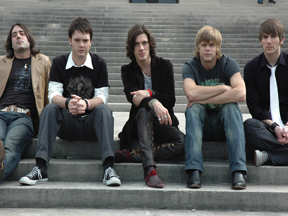JACKSON, Miss. — It has been four long months since Brandon Young grasped the long neck of his electric bass and laid down the low notes for The Terms rock band. A near-fatal Sept. 30 car crash put his rising music career on hold.
But not even a severe brain injury could make Brandon forget the familiar feel of strings and frets beneath his fingertips.
The Shreveport rocker recently grabbed a toy guitar and demonstrated a few bass notes for the staff at Methodist Rehabilitation Center in Jackson, Mississippi.
Angela Young took it as yet another sign that her 22-year-old son is getting back to his old self. “He says things now that make me think: That’s my Brandon,” she said. “Since coming to Methodist Rehab, the change has been borderline miraculous.”
When other rehab facilities were unable to accept Brandon because of his significant injuries and complications, a fortuitous connection landed the Youngs at Methodist Rehab, one of only 16 hospitals in the nation designated a Traumatic Brain Injury (TBI) Model System by the National Institute on Disability and Rehabilitation Research.
Mark Adams, the hospital’s CEO, had gone to Southwood High School in Shreveport with Brandon’s mom. When her friends alerted Adams to Brandon’s plight, he set a transfer in motion.
“I thank God every day that Mark expedited the process to accept Brandon,” she said. “Brandon’s second day at Methodist Rehab, he was in speech therapy and it was like something clicked. He progressed from that day forward. From what we came in with to what we have now – it’s astonishing.”
When the wreck occurred, Brandon and percussionist Blake Oliver and lead guitarist Clyde Hargrove were headed to a sound check at Sixth Street Bar in Monroe. Lead singer Ben Labat and drummer Scott Lasseigne were following close behind in the band’s equipment van.
As they crossed into an intersection, reports say the driver of a Ford Escort ran a stop sign and broadsided Oliver’s Toyota Four-Runner, flipping the SUV and tumbling its unbelted occupants.
The crash threw Hargrove under the SUV, fracturing his pelvis. Oliver was left with broken vertebrae in his neck and an almost severed thumb. Rescuers found Brandon struggling to breathe.
“A gentleman three houses down was a CPR instructor and he took control of the scene and probably saved Brandon’s life,” said his dad Jay. “He got his heart beating again.”
When they first caught sight of their son, the Youngs weren’t overly alarmed by his appearance. “He looked very uninjured … like he was sleeping,” his mom said. They couldn’t see that his battered and bruised brain was swelling to the point it might press on his brain stem and kill him.
“They kept telling us how severe it was and it was very possible he wouldn’t make it through the night,” said his mom.
The grim turn of events couldn’t have come at worse time for the The Terms – a group formed while all five members were students at Louisiana State University in Baton Rouge.
Their debut album “Small Town Computer Crash” had reached No. 11 on Billboard’s Heatseeker chart. LSU had selected their original song, “Welcome to the Now ( Evo Devo),” as the centerpiece of a national image campaign. Another song was being featured in “Mini’s First Time,” a movie starring Alec Baldwin, Jeff Goldblum and Luke Wilson. And they had even taped a performance for the “Megan Mulally Show.”
But that brink-of-fame lifestyle was soon forgotten as news sank in that Brandon might be on the brink of death.
After 45 days of battling one complication after another in ICU, Brandon finally arrived at Methodist Rehab on Nov. 14.
“When he was admitted, he couldn’t walk and he didn’t speak,” said Kristi Goodson, a nurse practitioner for the hospital’s brain injury program. But by starting intensive rehab as soon as he was medically stable, Brandon was able to reclaim both functions. “That allowed us to take advantage of the healing brain,” Goodson said.
Under the guidance of Methodist Rehab’s experienced brain injury clinicians and researchers, Brandon quickly showed signs of recovery, said his parents.
“One of the most important things to me was the first time he laughed,” his mom said. “I knew there was hope for his personality. And the first time I saw him walk, I just broke down in tears.”
TBI survivors typically see the most progress in the first six months after their injury. But Goodson said the brain can continue to heal two and a half to three years post-injury. “We expect him to continue to improve, which is one reason he’ll continue with outpatient therapy.”
Brandon has been home since Jan. 11, but he faces many hurdles ahead – including learning to eat solid foods, getting rid of a tracheotomy tube in his throat and undergoing surgery for fractures in his neck.
But with the help of family and friends – who’ve already formed prayer chains, staged benefit concerts and provided around-the-clock support – Angela Young believes better days are ahead. “We’ll go as long as it takes until he’s as well as he can get,” she said.
Adams said there’s no doubt that Brandon’s recovery will be hastened by the dedication of his “very close and loving” family.
“We can provide expert clinical guidance to help a patient's recovery, but it’s the prayers and support of family and friends that seems to be associated with the miraculous recoveries,” he said.

